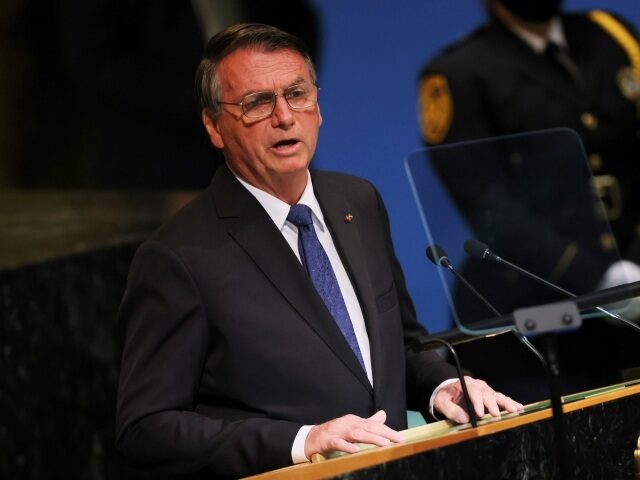Brazilian President Jair Bolsonaro used his address at the United Nations General Assembly on Tuesday – as per tradition, the first by a head of state at the event – to celebrate the “full recovery” of his nation’s economy in the aftermath of the Chinese coronavirus pandemic.
Bolsonaro, a conservative up for re-election in October, credited his administration’s rejection of economic lockdowns and mandates – as well as the eradication of corruption under previous leftist presidents, including presidential race frontrunner Luiz Inácio Lula da Silva – for Brazil’s economic success. He particularly celebrated growing rates of currency deflation and declining gasoline prices brought about without state intervention – a rarity in the Western Hemisphere, where both continents now boast a majority of leftists heads of government.
The Brazilian leader also used his speech to defend Russia from American and European sanctions, a result of Russia’s decision to escalate its eight-year-old invasion of Ukraine in February, and to call for “dialogue” between Russia and Ukraine.
Bolsonaro also discussed “sustainable development,” a term for injecting environmentalism into countries’ infrastructure enthusiastically embraced by U.N. leaders, and Brazil’s efforts to welcome migrants, extending a special invitation to Catholic clergy persecuted in Nicaragua to seek refuge in Brazil.
“Despite the global crisis, Brazil is getting to the end of 2022 with the economy at full recovery,” Bolsonaro told those assembled in New York. “We have high employment rates and low inflation rates. The economy is back on track, on the path of growth. Poverty has increased across the world under the impact of the pandemic. In Brazil, it began to fall sharply.”
Bolsonaro claimed Brazil “had unprecedented deflation in the months of July and August” and has experienced a 30-percent drop in gasoline prices since June.
“Today, one liter of gasoline in Brazil costs about $0.90 [about $3.40 a gallon]. The price of electricity has also dropped by more than 15 percent,” he noted, adding, “Let me emphasize, the cost of energy has not dropped because of price fixing or any other type of state intervention. Rather it was the result of a tax rationalization policy designed and implemented with the support of the national Congress.”
Bolsonaro also claimed to have “uprooted the systemic corruption that existed in the country,” referring primarily to a scandal known as “Operation Car Wash,” in which dozens of politicians of nearly every political party took kickbacks from private contractors to secure overpriced government contracts. The kickback scheme was largely in place under Lula, Bolsonaro’s rival in the presidential election.
Bolsonaro noted that Lula was convicted of using “Operation Car Wash” money to buy a luxury property by three different courts. The leftist-packed Supreme Federal Tribunal (STF), the nation’s highest court, overturned the convictions last year, allowing Lula to run.
“Between 2003 and 2015 alone, a period in which the left wing presided over Brazil, indebtedness levels at the oil state company Petrobras due to mismanagement and politically driven appointments and favors as well as the diversion of funds, reached up to $170 billion,” Bolsonaro told the United Nations. “The person responsible for that was unanimously convicted in three different court instances. Whistleblowers have returned $1 billion and we have paid to the U.S. stock market another 1 billion due to the losses incurred by shareholders. But that is the Brazil of the past.”
Bolsonaro concluded by addressing the ongoing war in Ukraine, defending his ally Russia from American and European sanctions. Bolsonaro has formally chosen a neutral stance on the war and maintained communications with Ukrainian President Volodymyr Zelensky but has publicly disagreed with economically isolating Russia to limit its ability to continue colonizing its neighbor.
“We defend an immediate ceasefire, the protection of civilians and noncombatants, the preservation of critical infrastructure to assist the population and the maintenance of all channels of dialogue between the parties in conflict. These are the first steps towards achieving a solution that is long-lasting and sustainable,” Bolsonaro said.
“We are against diplomatic and economic isolation,” he affirmed, later adding, “we do not believe that the best way is to adopt unilateral and selective sanctions, that are inconsistent with international law. These measures have harmed the economic recovery and threatened human rights of vulnerable populations, including in European countries.”

COMMENTS
Please let us know if you're having issues with commenting.